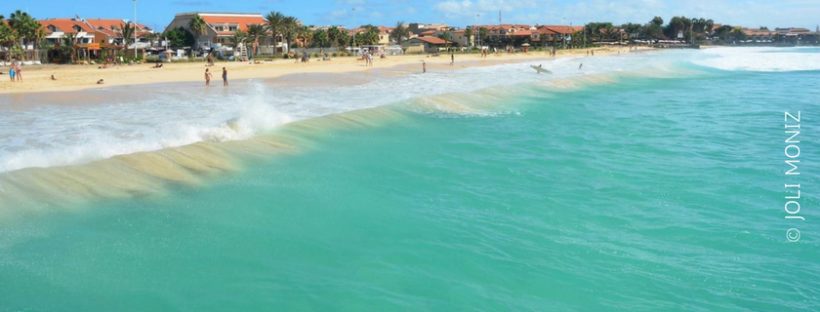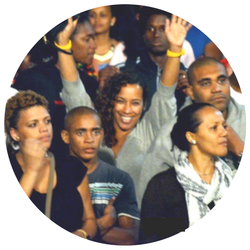 Joli lives in the island nation of Cape Verde, in the capital city of Praia. She’s lived there for about 5 years–and it feels like home to her.
Joli lives in the island nation of Cape Verde, in the capital city of Praia. She’s lived there for about 5 years–and it feels like home to her.
What’s your travel story?
I have family roots here. Like so many others, my great-grandparents left Cape Verde because of a period of drought in Cape Verde. So many people here want to go to the States or to Europe, just to survive. And then again, lots of people who left dream of coming back here, but it’s not always feasible.
I grew up in New England with an awareness of and a love of Cape Verdean culture. We had Cape Verdean art around the house, Cape Verdean music, traditional Cape Verdean meals. I learned a few words and phrases in Kriol. When I was 14 we came here on a family trip. That changed everything for me; I fell in love with Cape Verde.
I loved the dry terrain. It was a blessing of being African American but knowing where I was from, having such a strong cultural link. We went another time for a conference, and my sister and I visited when we were young adults. But two or three weeks was not enough to learn the language. I always said I’d come back for longer, at least for a summer, but I always had jobs that didn’t allow me to travel for a long time.
How did you make the decision to move abroad? When did you know it was time to make that leap?
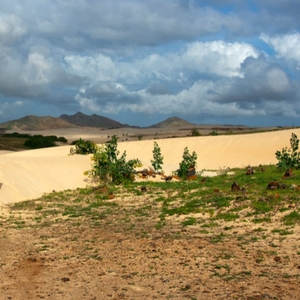
Deserto de Viana on the island of Boa Vista
I was in my mid-30s; I’d been in a career for 10 years. I loved it but I needed a change. I was working in administration at a private school in Westchester County, N.Y. The next logical step would have been to become head of a division and eventually Head of School — but I didn’t want that.
I was also very much in love and engaged to marry a guy I’d been with for about eight years. The next steps would’ve been buying a house in Westchester county and starting a family. I’ve always wanted to live abroad, and I have this entrepreneurial bug. My fiancé was more cautious, more frugal. I kept putting off taking any risks.
Two months before the wedding, I realized that the life I was about to have was not the life I wanted. I felt like I was about to let go of my dreams forever by trying to do the practical, “smart” thing. I was afraid of putting everything that I’m passionate about on hold. So I called off the wedding.
And then I told my boss that I wasn’t going to sign the contract for the next year. I’d been dragging my feet about signing; I didn’t know why. I just couldn’t see another year there. I just couldn’t see it.
Then I thought: I’m not getting married; I don’t have a mortgage. I realized I was free, that I could live anywhere I wanted. I tried to visualize where I would go. California? I don’t like the culture. Chicago? Too cold. And then it hit me: I could go to Cape Verde! I’m free to take that leap. I thought if I don’t take that leap right now, I’ll never do it.
I was nervous about telling my family. My dad is obsessed with Cape Verde; he’s come back like 30 times. I knew he’d be happy for me. He’s also a dreamer, a left brain. My mom is more the practical one. But she accepted it immediately which surprised me and assured me that I had made the right decision. They also supported my decision about the wedding, because they saw I was putting myself first for the first time in my life.
Three months later, I’d finished out my contract at school, undone all of the wedding plans and moved to Cape Verde. My plan was to press the reset button, to come learn the language, to get away for a year or so. But once I go here, I did not want to leave.
What’s life and culture like in Cape Verde?
The culture is so beautiful and so multi-faceted; I’m still learning about it. The music is amazing; I can’t get enough of it. For such a tiny country, there are so many genres! And the language on every island is unique.
 I love seeing brown people, people everywhere who look like me, black people owning property and businesses, running things. It’s so refreshing to have a majority experience, after going to and working in predominantly white schools and growing up in New England. I love not having to explain myself, to be around other folks who get me.
I love seeing brown people, people everywhere who look like me, black people owning property and businesses, running things. It’s so refreshing to have a majority experience, after going to and working in predominantly white schools and growing up in New England. I love not having to explain myself, to be around other folks who get me.
The weather is so nice most of the year. It’s never cold; there’s an ocean breeze. The water everywhere is beautiful. If I want a change of scenery, I can jump in the car and go to the countryside, or fly or take a boat to another island.
The quality of life is great. People here make time for each other. And you have the time to relax. Here, family is everything; family comes first. What really matters is the priority here: family, friendship, health.
The first settlement, Cidade Velha, was the first port in the tropic, the start of the triangular slave labor trade. So if you’re black and American, there’s a good chance that your ancestors came through these islands.
What are some of your biggest challenges?
It’s not always easy here, especially if you come as an immigrant and don’t know the language. You have to have three things to thrive here:
-
- You have to be passionate about it.
- You have to be persistent.
- You have to be patient. Cape Verde is pretty organized for a developing country, but there’s still a lot of bureaucracy, a lot of paper pushing; everything has to be stamped, signed and stapled. Nothing here is easy or fast. Don’t expect to send an email and get the job done. You have to go someplace in person, maybe twice or three times! That can be frustrating. You have to learn and let it go. The bank visit is not going to be the most efficient; a lot of times it’s crowded and moves slowly. I’ve learned to take a ticket, go grocery shopping and come back.
As an aside, the pay is low, so if you can find a way to make dollars or Euros you will be much better off.
But the things I love about Cape Verde far outweigh these things.
How did you start your business?
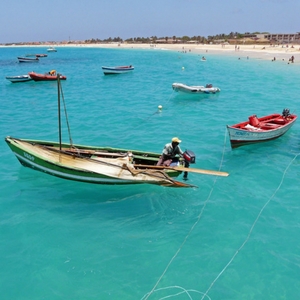 I’d been hosting friends and family who’d come to visit Cape Verde and check in on me. I loved showing people around. Several months after I came here, a friend asked me, “Have you ever thought about doing this for a living?”
I’d been hosting friends and family who’d come to visit Cape Verde and check in on me. I loved showing people around. Several months after I came here, a friend asked me, “Have you ever thought about doing this for a living?”
I’d started to realize that I might not want to leave Cape Verde. So that summer, I started working on my business. I formalized everything, and opened it up. I posted about it on social media, taking photos, promoting Cape Verde as a positive, beautiful place. I have a staff person now to help me with the business.
Everything that I love, I’m trying to put into my business. I’m creating a virtual gift shop as a way to support Cape Verdean artists and promote local businesses. And I’ve been arranging short-term rentals and helping some clients, first and second generation Cape Verdeans (and some Europeans and Americans) who want to buy property here.
I think Cape Verde is a perfect destination. On a practical level: It’s small, well-governed. You don’t need vaccinations; tourists can get a visa upon entry. It’s beautiful; the people are friendly. People come here and fall in love with it.
What’s your social life like now? How do you meet people?
I meet people easily here; that’s how Praia is. I have so many social opportunities. Cape Verdeans love to party. Almost every weekend there’s a festival–I’m not exaggerating! Every night you can hear live music, and people really dance here .
People are social and friendly. When you walk into a restaurant, you always greet the people sitting there. It’s all about family; everybody has kids. There are always weddings, baby showers, birthday parties. If you’re having a party there’s no thought of keeping the guest list small. That’s the African culture; it’s very community based. We’ll just be together and enjoy each other’s company.
Also, it’s small. Praia is the capital; it’s bigger than the other towns, but you can expect to bump into people you know when you go to the gas station, the store. This can be a good or a bad thing, depending.
In the more touristy areas, people speak English, but it’s better if you can learn some Kriol. I’ve learned Kriol by just living here and paying attention while I’m riding in taxis, going to stores, hearing people on the street, listening to music. I had my index cards just to get by. People are so nice and patient, especially if you make an effort. Like my dad told me: Drink a little grogue, find a boyfriend, and you’ll be speaking Kriol real fast!
Are you dating? What’s that like?
There are beautiful black men everywhere! It seems like it’s a great dating pool. It’s a critical mix of African and Portuguese. People here love to be in love. They’re very passionate. I found that guys in the States are hesitant and resistant to love and relationships. Here, men are much more comfortable showing their emotions and being affectionate. They fall in love faster; they don’t have that fear of commitment.
However, most of the men are not faithful–and that’s very important for me. There are still some good men who are all about their women, their family; it’s not impossible. But a lot of those men are already married.
A few decades ago, the culture was more traditional; women stayed at home and were financially dependent on a man. Now in the city, there are independent women with good jobs. Women don’t have to put up with a bad marriage if they don’t want to. Now, it’s not uncommon for women to cheat.
There’s no stigma at all here for divorce and separation. Non-traditional families and common law marriages are very common here. Children are always a blessing. So even if you have three children as a woman, it’s easy to find a new man.
My first boyfriend here had to move to a different island for work, and I didn’t want to live there. Then for about two years, I was involved with a younger guy, but we eventually called it quits.
How does it feel to be an American there? Do people ask you about our current president?
People do recognize what a catastrophe the current state of U.S. politics is. But America still has a positive image because of President Obama, and because there are more Cape Verdeans in America than there are here! Lots of successful immigrants have gone to the States and send back money to their families.
I’m very much American as well. I love that country; I’m grateful for the opportunities that it gave me. I see so many smart talented people here who have limitations. I have so many advantages because of my passport.
I am devastated by the current state of the U.S. It makes me appreciate Cape Verde more. I’m so glad to be here now; I just wish my family were here with me.
What’s next for you?
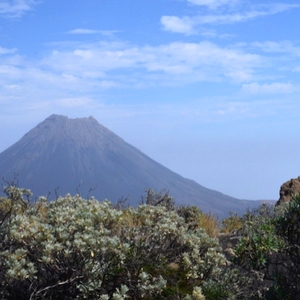
Pico do Fogo, Cape Verde’s highest peak
My business is enough to keep me busy. I’m starting to offer package trips that include another African country, like Cape Verde and Senegal; Cape Verde and Ghana, etc. If my clients’ real estate purchases work out, I can help manage the properties, decorate them. So I plan on doing more of the same, expanding my business and traveling the world more.
I want to have a base here for life. My dad has a piece of land here that we’re looking into building on. My ideal situation would be more back and forth between here and the States. I can communicate with my friends and family back home, but I’ve missed some big important events. I don’t get to see my nieces and nephews as often as I like. And I’d like to be a mom, somehow, some way.
Sometimes I think I need to ship over all of my furniture and my art collection from the States. I’ve lived in different places, and this is the only place I’ve truly felt at home. It still happens to me a lot that I look around at where I am and I thank God and the universe for bringing me here.
Where you can find Joli
- A Vontade Tours
- Joli Moniz Design
- Instagram: avontadetours
- Facebook: AVontadeTours
